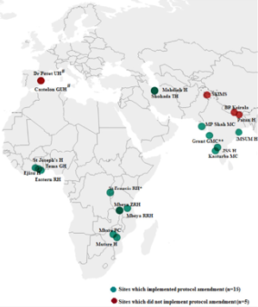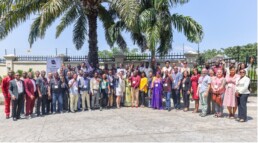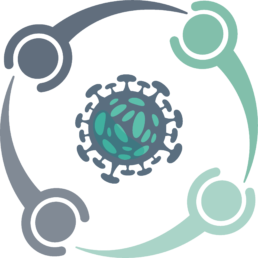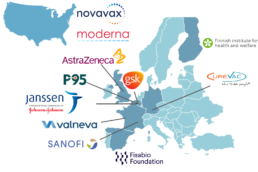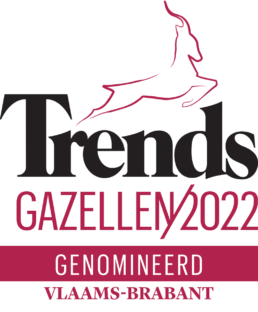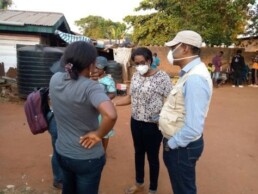Under-ascertainment of Respiratory Syncytial Virus infection in adults due to diagnostic testing limitations
Under-ascertainment of Respiratory Syncytial Virus infection in adults due to diagnostic testing limitations

In 2022, the P95 team collaborated on a systematic review and meta-analysis to quantify testing under-ascertainment of adult respiratory syncytial virus (RSV) infection. A total of 8066 unique references were screened, of which 154 met the inclusion criteria. The analysis showed that RT-PCR, particularly singleplex testing, is the most sensitive RSV diagnostic test in adults and that accuracy can be improved by assessing ≥3 specimen types.
https://academic.oup.com/jid/advance-article/doi/10.1093/infdis/jiad012/6994132?login=false
WHO Global Vaccine Safety Study in pregnancy
WHO Global Vaccine Safety Study in pregnancy
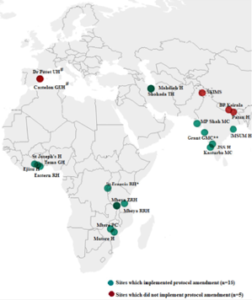
In 2017, the WHO launched the Global Vaccine Safety Multi-Country Collaboration Study on Safety in pregnancy to estimate the minimum detectable risk for selected perinatal and neonatal outcomes and assess the applicability of standardized case definitions for study outcomes and maternal immunization in low- and middle-income countries (LMICs). P95 was involved in study coordination and data management.
The study closed in 2020 and resulted in the following publications:
https://www.sciencedirect.com/science/article/pii/S0264410X18312933?via%3Dihub
https://www.thelancet.com/journals/eclinm/article/PIIS2589-5370(22)00236-X/fulltext
https://www.sciencedirect.com/science/article/pii/S2590136222000201?via%3Dihub
https://www.sciencedirect.com/science/article/pii/S2590136221000401?via%3Dihub
Back to epidemiological studies
CEPI ENABLE Study on the incidence of Lassa Fever in West Africa
CEPI ENABLE Study on the incidence of Lassa Fever in West Africa
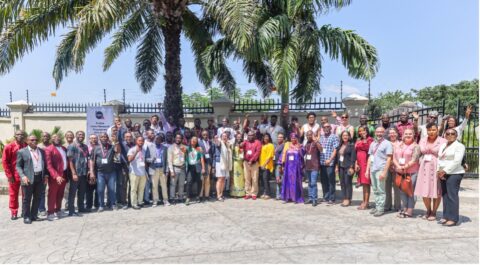
The Enable Lassa Fever Research programme, funded by the Coalition for Epidemic Preparedness Innovations (CEPI), was launched in 2019 to estimate the incidence of infection and disease due to Lassa Fever Virus in five West African countries (Benin, Guinea, Liberia, Nigeria and Sierra Leone). The study has successfully enrolled approximately 23,000 participants, who are now being followed up for a period of 24 months. As the coordinating partner, P95 ensures a high adherence to the planned implementation steps and epidemiological aspects of the program, working in close collaboration with other Programme Head Quarters partners (Epicentre, BNITM and MMARCRO), CEPI (funder) and the implementing partners in the countries.
Read more about the project on the following websites:
https://cepi.net/news_cepi/largest-ever-lassa-fever-research-programme-launches-in-west-africa/?swcfpc=1
https://epi.tghn.org/epidemiology/epi-studies/
Protocol paper coming soon.
Back to epidemiological studies
VITAL: Vaccines and Infectious Diseases in the Ageing PopuLation
VITAL: Vaccines and Infectious Diseases in the Ageing Population
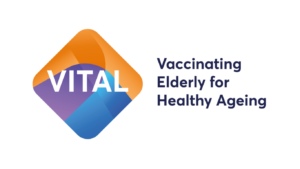
The VITAL project was launched in 2019, aiming to improve the efficacy of vaccines to protect the growing aging population against infectious diseases, by providing evidence-based knowledge on vaccination strategies to establish healthy aging. The project assesses infectious disease burden and mechanisms of immunosenescence by establishing links with existing projects combined with novel data acquired through an extensive network of data registries across Europe. Different partners share their expertise across different Work Packages. P95 leads Work Package 1, which aims to quantify the direct burden of infectious diseases in an aging population (50 years +) across European countries.
The VITAL project is funded by the Innovative Medicines Initiative 2 with support from the European Union’s Horizon 2020 research and innovation programme and the European Federation of Pharmaceutical Industries and Associations.
Read more about VITAL on the project website: https://vital-imi.eu/
Back to epidemiological studies
COVIDRIVE Partnership on COVID-19 vaccine effectiveness in Europe
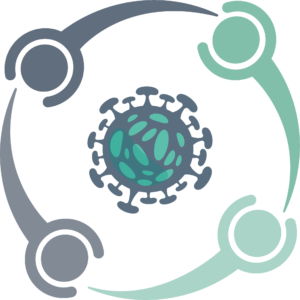
COVIDRIVE is a not-for-profit public-private partnership launched in June 2021 to address the joint need to monitor COVID-19 vaccination programs for public health institutes in Europe and to assess brand-specific COVID-19 vaccine effectiveness (CVE) for the companies as part of their regulatory obligations. The first COVID-19 vaccine effectiveness study started in September 2021. P95 co-coordinates the vaccine effectiveness studies as one of the non-industry partners.
Read more about COVIDRIVE on the project website: https://covidrive.eu/
Back to epidemiological studies
17 February 2023
COVIDRIVE welcomes three new vaccine companies to the consortium
COVIDRIVE welcomes three new vaccine companies to the consortium
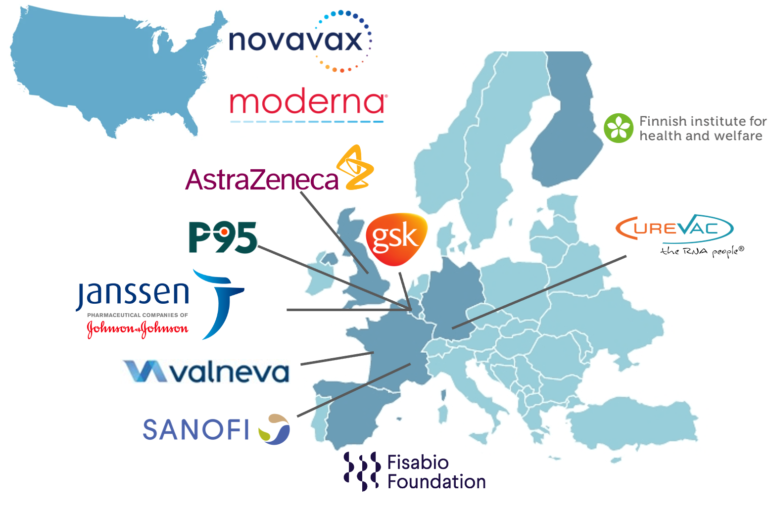
Moderna, Novavax and Valneva have joined COVIDRIVE, a public-private partnership for COVID-19 vaccine effectiveness monitoring in Europe.
08/02/2022 – Three new vaccine companies (Moderna, Novavax and Valneva) have joined the COVIDRIVE consortium and officially become COVIDRIVE partners. Moderna, Novavax and Valneva will further contribute to the assessment of the effectiveness of COVID-19 vaccines in Europe to support the region’s public health response and address the vaccine companies’ regulatory obligations.
With the inclusion of these three newcomers, COVIDRIVE, which brings together public institutions, small and medium-sized enterprises and vaccine companies, has a total of 11 partners.
The new COVIDRIVE partners reflected on their participation in the consortium and the value of multi-stakeholder initiatives to monitor the effectiveness of the COVID-19 vaccines.
First, Dr Jacqueline Miller, Moderna’s Senior Vice President and Therapeutic Area Head, Infectious Disease Development, explained: “We are pleased to join the COVIDRIVE consortium and contribute to this collaboration advancing global public health. We believe that public-private partnerships play a key role in combatting the COVID-19 pandemic. As a global company, it is critical to understand data from all geographies because as we have seen throughout this pandemic, what affects one part of the world, can soon affects others. Assessing vaccine effectiveness through real-world evidence is an important tool as we try to remain ahead of the virus as it evolves.”
Moreover, Dr Seth Toback, Senior Vice President, Global Medical Affair at Novavax, commented: “Novavax is proud to join COVIDRIVE and partner across the healthcare sector in our efforts against COVID-19. We believe it is important to have multiple vaccine options available for people, particularly as we assess the need for boosters, annual revaccination, and reaching the paediatric population. This is an exciting development as we continue to work towards the development of life-saving vaccines and fight against the ongoing pandemic.”
Finally, Dr Judith Perez Gomez, Valneva’s Vice-President of Medical Affairs pointed out that “Public-private partnerships have proven to be extremely valuable for enabling R&D innovation and are even more important today as we fight the COVID-19 pandemic. We are extremely pleased to join COVIDRIVE and support Europe’s public health response through the assessment of vaccine effectiveness.”
About Moderna
Moderna is a biotechnology company based in Cambridge, Massachusetts (United States) pioneering messenger RNA (mRNA) therapeutics and vaccines. The Moderna COVID‑19 vaccine, codenamed mRNA-1273 and sold under the brand name Spikevax, received the emergency use authorisation by the U.S. Food and Drug Administration (FDA) in December 2020 and conditional marketing authorisation in the European Union by the European Medicines Agency (EMA) in January 2021. More information: www.modernatx.com.
About Novavax
Novavax, Inc. (Nasdaq: NVAX) is a biotechnology company that promotes improved health globally through the discovery, development and commercialization of innovative vaccines to prevent serious infectious diseases. The company's proprietary recombinant technology platform harnesses the power and speed of genetic engineering to efficiently produce highly immunogenic nanoparticles designed to address urgent global health needs. NVX-CoV2373, the company’s COVID-19 vaccine, has received authorization from multiple regulatory authorities globally, including Conditional Marketing Authorization from the European Commission and Emergency Use Listing from the World Health Organization. The vaccine is also under review by multiple regulatory agencies worldwide. More information:www.novavax.com.
About Valneva
Valneva is a specialty vaccine company based in Saint-Herblain (France) focused on the development and commercialization of prophylactic vaccines for infectious diseases with significant unmet medical need. Valneva has developed an inactivated, adjuvanted vaccine candidate against COVID-19, VLA2001, which is currently under rolling review by the EMA. More information: www.valneva.com.
About COVIDRIVE
COVIDRIVE is a public-private partnership launched in 2021 to address the joint need to monitor COVID-19 vaccination programmes for public health institutes in Europe and to assess brand- specific COVID-19 vaccine effectiveness (CVE) for the companies as part of their regulatory obligations. For more details on COVIDRIVE please check our website www.covidrive.eu.
If you would like to request a COVID-19 vaccine effectiveness study and/or participate as a partner/study site in COVIDRIVE, send an email to the following address: info@covidrive.eu
P95 nominated for the Trends Gazelles Flemish Brabant 2022
P95 nominated for the Trends Gazelles Flemish Brabant 2022
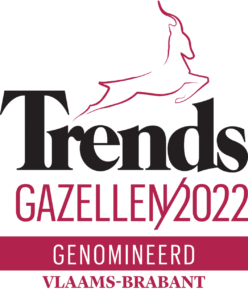
P95 is one of the nominees for the 2022 edition of Trends Gazelles Flemish Brabant. Trends Gazelles award aims to distinguish the fastest-growing Belgian companies over the past 5 years.
For 21 years, Trends Gazelles (www.trendsgazellen.be) has nominated between 50 to 250 companies in each province, distinguished as a source of energy for the economy and as inspiration for entrepreneurs. Nominees in 3 categories – small, medium, and large enterprises – are then ranked based on growth in added value, staff, and cash flow. They must have created at least 10 jobs since its creation and show sufficient operational independence. The 3 top-ranked companies, to be announced in February 2021, will be awarded the title of “Trends Gazelles Ambassador”.
P95 is honoured to have earned this recognition that shows the rising impact of the company at the regional and national levels.
P95 appoints Henk Hoornaert as Chief Commercial Officer
P95 appoints Henk Hoornaert as Chief Commercial Officer

P95 has appointed Henk Hoornaert as Chief Commercial Officer (CCO). After two years of accelerated growth, this appointment will strengthen P95’s structure and improve business development, marking a further step towards a more stable and mature organization.
Henk Hoornaert holds a Master in Physical Education and a Postgraduate degree in Economics from the University of Leuven. He developed a vast career in the pharma sector, from medical representative in 1992, to product manager, local and then regional marketing team lead for Pfizer’s portfolios, including Cardiovascular, Alzheimer and Inflammation. During the last 3 years, Henk has been General Manager, first in Belgium and Luxembourg for Upjohn, a Pfizer division, and later in Austria and Switzerland at Viatris.
P95 CEO Thomas Verstraeten reacts: “As we are nearing the end of 2021, we have made good progress in strengthening P95, and we have the opportunity to invest in improving our structures and hiring for new positions. Needless to say that Henk knows the pharma industry inside-out and his vast commercial and managerial experience will strengthen the management team significantly. As CCO, Henk will help us set up a commercial framework to support our ever-growing range and number of projects.”
Largest ever Lassa fever study expands to more countries in West Africa
Largest ever Lassa fever study expands to more countries in West Africa
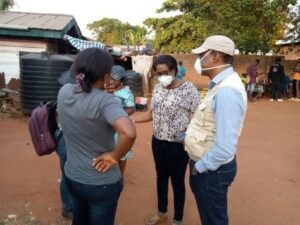
July 28 2021, Oslo Norway, Cotonou Benin, Conakry Guinea, Monrovia Liberia, Abuja Nigeria, and Kenema Sierra Leone – The largest ever study created and funded by the Coalition for Epidemic Preparedness Innovations (CEPI) to provide a more accurate assessment of the incidence of Lassa fever infections has launched in several more countries in West Africa.
CEPI is providing US$ 10.3 million in funding to partners in Benin, Guinea, Liberia, and Sierra Leone to participate in the epidemiological research programme Enable, which will enrol up to 23,000 participants, including Nigeria, which began collecting participant data in December 2020. The in-country partners selected for the research are Fondation pour la Recherche Scientifique (FORS) in Benin, Phebe Hospital in partnership with the National Public Health Institute of Liberia (NPHIL) in Liberia, supported by University of North Carolina at Chapel Hill (UNC), Kenema Government Hospital in Sierra Leone (KGH) in cooperation with Tulane University, and Université Gamal Nasser de Conakry (UGANC) in Guinea, in partnership with Robert Koch Institut (RKI).
First identified in 1969, Lassa fever is a potentially deadly haemorrhagic illness occurring across West Africa, with an estimated 1% of cases proving fatal. It is listed on the World Health Organization (WHO) R&D Blueprint as an emerging infectious disease in urgent need of research and development and is also recognised in CEPI’s ambitious $3.5bn plan to tackle future epidemics and pandemics caused by known and unknown threats.
However, our current knowledge on the annual Lassa case rate is hindered by a lack of formal and standard clinical diagnoses for the illness and significant variability and severity in symptoms, with the majority of patients who become infected thought to be asymptomatic and failing to seek diagnosis. Cases may also occur in remote regions where there are difficulties in accessing health care services for testing. As a result, the true case count is unknown and likely to be much higher than current estimates of 100,000 to 300,000 cases per year.
The Enable study therefore aims to better understand the rate, location, and spread of Lassa virus across the region. Data collected in the countries will highlight any differences in the age and gender of people who become infected, while also providing a more accurate overview on the proportion of asymptomatic and symptomatic cases.
In addition, results from Enable will be crucial in supporting CEPI’s goal, as part of its five-year lookahead strategy, of producing a licenced Lassa vaccine for routine immunisation. As a leading funder of Lassa vaccine development, CEPI has already supported the development of six Lassa vaccine candidates. Two of these vaccines, developed by partners Inovio and Themis Bioscience, entered Phase I trials in 2019, and a further vaccine candidate, developed by IAVI, started in-human testing this year.
Data provided from the Enable research programme may therefore guide the location and implementation of future late-stage efficacy trials to evaluate these or other Lassa vaccine candidates. It could also help to define an appropriate vaccination strategy once a Lassa vaccine is approved for use, for example by helping to identify priority populations at risk.
The research will also support another goal in CEPI’s five-year plan assisting countries with developing the infrastructure and expertise to undertake the epidemiological and clinical studies needed to advance vaccine development and enable such countries to take full ownership of their national health security.
There have been a number of positive developments in the Lassa vaccine space over the past couple of years, with multiple candidates now moving into in-human testing. To continue this momentum and to meet CEPI’s goal to get a licensed Lassa vaccine for routine immunisation, we must therefore now advance our disease-assessment efforts to provide the critical data for future late-stage Lassa vaccine clinical trials.
The results produced by the Enable research programme will be vital in contributing to this endeavour, while also providing novel information to help support healthcare workers and researchers in the region working on this potentially deadly threat.
Melanie Saville
Director of Vaccine Research and Development, CEPI
Enable research partners will collect data on potential infections either through ‘active case follow-up’, whereby a field worker carries out repeat health assessments on study participants through home visits or phone meetings to assess the health status of participants, or ‘passive case detection’, where participants will be encouraged to report potential illness or to self-present at a health facility and the suspected or confirmed case is then recorded.
A subset of those enrolled will also take part in an additional assessment to look at the prevalence of Lassa fever antibodies–biomarkers of the immune response–among participants. This will act as an indicator to better guide estimates of how many individuals in the general population are likely to have previously been infected with the virus and are, at present, protected against (immune from) the disease; it is generally assumed that a single infection with Lassa fever virus will produce life-long protective immunity.
Enable research partners will collect data on potential infections either through ‘active case follow-up’, whereby a field worker carries out repeat health assessments on study participants through home visits or phone meetings to assess the health status of participants, or ‘passive case detection’, where participants will be encouraged to report potential illness or to self-present at a health facility and the suspected or confirmed case is then recorded.
A subset of those enrolled will also take part in an additional assessment to look at the prevalence of Lassa fever antibodies–biomarkers of the immune response–among participants. This will act as an indicator to better guide estimates of how many individuals in the general population are likely to have previously been infected with the virus and are, at present, protected against (immune from) the disease; it is generally assumed that a single infection with Lassa fever virus will produce life-long protective immunity.
I am delighted to be part of the Lassa fever study in West Africa. This rigorous scientific study will allow us to collect precise data to allow the country and partners to plan evidence-based interventions and controls.
Prof. Ayola Akim Adegnika
Principal Investigator, FORS Benin
The CEPI Enable epidemiological study is the largest Lassa haemorrhagic fever research project ever implemented in Guinea. In terms of public health, it will be of great interest both for the community to better understand the illness and for health authorities to appreciate the burden of Lassa fever. The community is grateful to CEPI for its support.
Dr. N’Faly Magassouba
Principal Investigator, Gamal Abdel Nasser University of Conakry, Guinea
There were challenges when we first started, and bottlenecks we’ve encountered, especially encouraging people in our culture to participate in research studies.
But our team has been working to enroll participants and we’re learning lessons as we go; in fact, as we go, our study is progressing better than we could have imagined. Our participants have expressed the pride they have in Liberia, and in their communities, for playing a role in a future that could ultimately be Lassa free.
Dr. Jefferson Sibley
Phebe Hospital Medical Director, Liberia
CEPI’s program to assess the incidence of Lassa virus infections in West Africa has been meticulously planned. These essential epidemiological studies will provide the foundation for clinical trials of promising Lassa vaccines that have to potential to achieve control of this massive public health threat.
Dr. Robert Garry
Tulane University, co-principal investigator working in cooperation with Kenema Government Hospital in Sierra Leone
Seven thousand participants have already been recruited into the Nigerian component of the Enable programme, led by the Nigeria Lassa fever Research Consortium consisting of the Nigeria Centre for Disease Control (NCDC) and supporting partners.
As part of CEPI’s access commitments, data for both the Nigerian study and programmes announced today will be made available to partners and the public via peer-reviewed open-access publications and via CEPI’s hub on The Global Health Network.
The Enable Lassa programme is building on collaboration among countries in West Africa most affected by Lassa fever to generate data and evidence that we urgently need for vaccine R&D. We are excited about the prospects of the project, not only in generating data for vaccine development, but also in strengthening our knowledge of the epidemiology of this disease and improving on the much-needed interventions for disease control.
Dr. Chikwe Ihekweazu
Director-General of Nigeria Centre for Disease Control
The study methodology and protocol were devised in collaboration with the coordinating partners who are now supporting the participating countries during implementation. All will follow a harmonised core protocol and methods to allow for standardised recording and comparability of data across the countries. Coordinating institutions supporting the overall Enable programme implementation include P-95, Margan Clinical Research Organization (MMARCRO), Epicentre, and the Bernard Nocht Institute for Tropical Medicine (BNITM).
The COVIDRIVE project has been officially launched
The COVIDRIVE project has been officially launched

A new public-private partnership – COVIDRIVE – announced today that it will begin studies to assess the effectiveness of multiple COVID-19 vaccines in Europe to support the region’s public health response and to address the vaccine companies’ regulatory obligations. This multi-stakeholder partnership brings together public institutions, small medium enterprises and vaccine companies, including FISABIO (Spain), P95 (Belgium), THL (Finland), AstraZeneca (UK), CureVac (Germany), Janssen (Belgium), Sanofi-Pasteur (France) and GSK (Belgium).
The partnership will conduct several studies to analyse COVID-19 vaccine effectiveness in real-world conditions to complement what is known from robust clinical trials conducted for marketing authorisations. In addition to overall effectiveness for each brand of vaccine, key areas of interest include: duration of vaccine protection, effectiveness against disease caused by newly emerging SARS-CoV-2 strains, effectiveness against severe COVID-19 disease and effectiveness in special risk groups such as immunocompromised, frail individuals or subjects with chronic conditions or existing comorbidities.
COVIDRIVE will leverage an existing influenza vaccine effectiveness platform (DRIVE), which has provided annual brand-specific influenza vaccine effectiveness estimates to the European Medicines Agency (EMA) since 2017.
AstraZeneca and Janssen will be the first pharmaceutical companies in the partnership to launch their brand-specific COVID-19 vaccine effectiveness assessments through COVIDRIVE, starting in July 2021.
For more details on COVIDRIVE please check our website https://covidrive.eu
If you would like to request a COVID-19 vaccine effectiveness study and/or participate as a partner/study site in COVIDRIVE, send an email to COVIDRIVE Coordination team (info@covidrive.eu)

